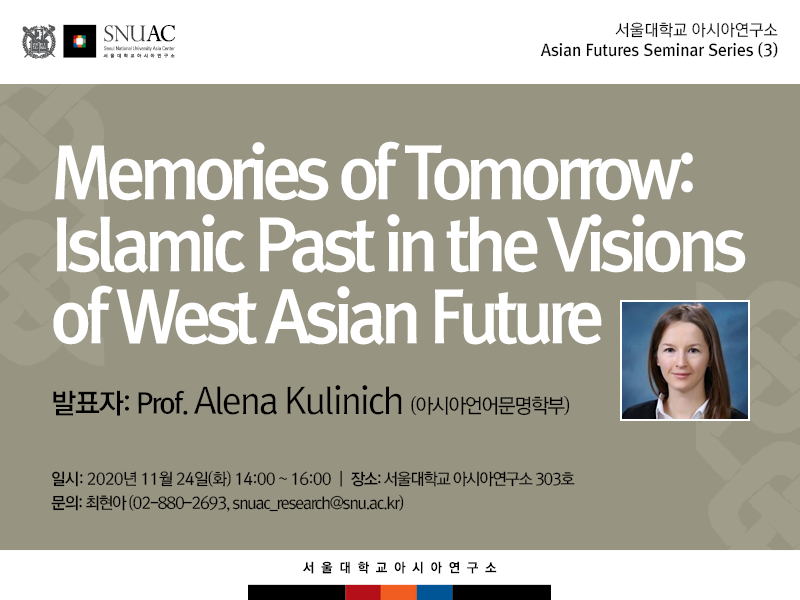Memories of Tomorrow: Islamic Past in the Visions of West Asian Future
- Date: November 24th, Tuesday, 2020 14:00 – 16:00
- Online lecture via Zoom (https://snu-ac-kr.zoom.us/j/96930041282) [in English]
Asian Futures Seminar Series (3)
Lecture 3)
- Date: November 24th, Tuesday, 2020 14:00
- Speaker: Alena Kulinich (Asian Languages and Civilizations, College of Humanities)
- Title: Memories of Tomorrow: Islamic Past in the Visions of West Asian Future
※ Zoom URL: https://snu-ac-kr.zoom.us/j/96930041282
ALENA KULINICH
March 2020 –
present
Associate Professor of West Asian Studies, Department of Asian Languages and Civilizations, Seoul National University
2013 – 2020 Assistant Professor of West Asian Studies, Department of Asian Languages and Civilisations, Seoul National University
2011 – 2013 Research Assistant (The Qur’ān Project), The Institute of Ismaili Studies, London
2010 – 2013 Senior Teaching Fellow, Department of History and Department of the Study of Religions, School of Oriental and African Studies (SOAS), University of London
Abstract
Against the background of colonial and postcolonial conditions, the ongoing search for authenticity (aṣliyya) and a renewed interest in cultural heritage (turāth), all major ideologies in the 20th and 21st centuries’ West Asia have drawn on Islamic past to legitimise the futures they envisioned. This paper focuses on the uses of Mu‘tazilism, a rationalist tradition of Islamic thought that flourished during the ‘Abbasid Caliphate (750–1258), as a symbol, model and a source of inspiration for the visions of West Asian future. Modern endeavours to rediscover and revive this tradition, often referred to as Neo-Mu‘tazilism, span across geographical, cultural and political divides. Exploring its appeal in these diverse contexts, the paper highlights the changing perceptions of this tradition. It discusses various interpretations of Mu‘tazilism as a symbol of progress, freedom, and a better future, inspired by Mu‘tazilite rationalism, their doctrine of free will, and the idea of the ‘golden age’ of Islamic civilisation under the ‘Abbasids. The discovery and publication of Mu‘tazilite sources from the 1960s onwards have enabled a deeper exploration of Mu‘tazilite thought. Several Muslim intellectuals have engaged creatively with its various aspects to envision the revival and reform of Islam. As a rationalist tradition, today Mu‘tazilism remains the subject of great expectations and a potential source of inspiration for the new visions of tomorrow in West Asia and beyond.
Lecture 4)
- Date: December 11th, Friday, 2020 14:00
- Speaker: Stephan Sonnenberg (Clinical Law, Law School)
- Title: Revisiting the “Asian Values” debate: human rights, human dignity, and personal responsibilities

